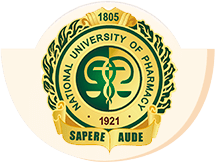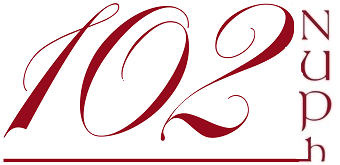On May 17 the VIIth scientific and practical conference with international participation “Quality Management in Pharmacy” took place in the NUPh. Traditionally, the forum participants summed up the activities, identified the tasks and prospects. The conference was organized by the Department of Quality Control, about 100 participants took part in the conference. The working languages of the event were Ukrainian, Russian and English.
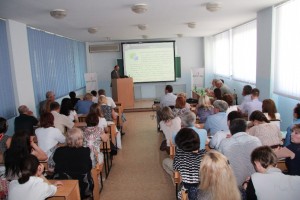 The book of abstracts published over 215 theses in the areas of: trends and development prospects of quality management in pharmacy; approaches to quality assurance at the stages of life cycle of medicinal products – from development and research, to production and sales; development and implementation of quality management systems and integrated management systems in the pharmaceutical, biotechnology enterprises; training of personnel in quality management for the pharmaceutical industry; risk assessment, monitoring and review of processes of pharmaceutical quality systems; audits and self-inspection in the enterprises of pharmaceutical sector; regulatory activities related to circulation of medicines; usage of methods and facilities of quality management in pharmacy, etc.
The book of abstracts published over 215 theses in the areas of: trends and development prospects of quality management in pharmacy; approaches to quality assurance at the stages of life cycle of medicinal products – from development and research, to production and sales; development and implementation of quality management systems and integrated management systems in the pharmaceutical, biotechnology enterprises; training of personnel in quality management for the pharmaceutical industry; risk assessment, monitoring and review of processes of pharmaceutical quality systems; audits and self-inspection in the enterprises of pharmaceutical sector; regulatory activities related to circulation of medicines; usage of methods and facilities of quality management in pharmacy, etc.
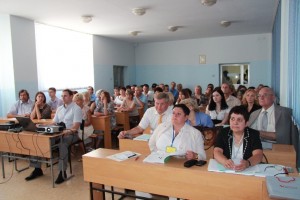 The NUPh holds annual scientific and practical conferences on quality management in pharmacy since 2006. Geography of participants widens every year. Thus, this year, in addition to the NUPh representatives and representatives of sectoral higher education institutions of Ukraine, in the conference participated members of staff of the State Service of Ukraine on Medicinal Products, State Enterprise “State Expert Center of the Ministry of Public Health of Ukraine”, State Enterprise “Ukrainian Scientific Pharmacopoeial Centre for quality of drugs”, number of leading medicines enterprises, representatives of practical pharmacy. Neighboring countries were represented by the staff of I.M. Sechenov First Moscow State Medical University (Moscow, Russia), State Educational Establishment of Higher Education “Perm State Pharmaceutical Academy” of Federal Agency of Public Health and Social Development of the Russian Federation (Perm), pharmaceutical distribution company LLC “Natalie Farm” (Yerevan, Armenia), Kazakh National Medical University named after S.D. Asfendiyarov (Almaty, Kazakhstan), Kursk State Medical University (Kursk, Russia), Siberian State Medical University (Tomsk, Russia), Tajik National University (Dushanbe, Tajikistan), Tashkent Pharmaceutical Institute (Tashkent, Uzbekistan). Materials for publication were also sent by representatives of Uganda, Israel, Nigeria and India.
The NUPh holds annual scientific and practical conferences on quality management in pharmacy since 2006. Geography of participants widens every year. Thus, this year, in addition to the NUPh representatives and representatives of sectoral higher education institutions of Ukraine, in the conference participated members of staff of the State Service of Ukraine on Medicinal Products, State Enterprise “State Expert Center of the Ministry of Public Health of Ukraine”, State Enterprise “Ukrainian Scientific Pharmacopoeial Centre for quality of drugs”, number of leading medicines enterprises, representatives of practical pharmacy. Neighboring countries were represented by the staff of I.M. Sechenov First Moscow State Medical University (Moscow, Russia), State Educational Establishment of Higher Education “Perm State Pharmaceutical Academy” of Federal Agency of Public Health and Social Development of the Russian Federation (Perm), pharmaceutical distribution company LLC “Natalie Farm” (Yerevan, Armenia), Kazakh National Medical University named after S.D. Asfendiyarov (Almaty, Kazakhstan), Kursk State Medical University (Kursk, Russia), Siberian State Medical University (Tomsk, Russia), Tajik National University (Dushanbe, Tajikistan), Tashkent Pharmaceutical Institute (Tashkent, Uzbekistan). Materials for publication were also sent by representatives of Uganda, Israel, Nigeria and India.
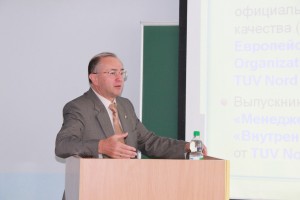 Opening the conference, vice-rector on scientific work of the NUPh, head of the Department of Quality Management, D.Sc. in Chemistry, professor S.M. Kovalenko said: “Quality management – is direction that is developing rapidly. And today it is very pleasant to note that we have established and maintained close contacts with foreign colleagues, particularly from Russia: experts of our Department have already conducted ten seminars on good pharmaceutical practices, numerous other activities, including – development of relevant methodological issues, have been scheduled. And with Perm State Pharmaceutical Academy we are connected by special partnership. Synthetic School of the NUPh was substantially established by P.A. Petyunin, scientist who went through formation in Perm, brought us the knowledge, educated cohort of scientists, including V.P. Chernykh “.
Opening the conference, vice-rector on scientific work of the NUPh, head of the Department of Quality Management, D.Sc. in Chemistry, professor S.M. Kovalenko said: “Quality management – is direction that is developing rapidly. And today it is very pleasant to note that we have established and maintained close contacts with foreign colleagues, particularly from Russia: experts of our Department have already conducted ten seminars on good pharmaceutical practices, numerous other activities, including – development of relevant methodological issues, have been scheduled. And with Perm State Pharmaceutical Academy we are connected by special partnership. Synthetic School of the NUPh was substantially established by P.A. Petyunin, scientist who went through formation in Perm, brought us the knowledge, educated cohort of scientists, including V.P. Chernykh “.
Then professor S.M. Kovalenko outlined in his report the ways to optimize teaching and scientific activities at the Department of Quality Management of the NUPh. In particular, Sergey Mikhaylovich underlined that experts in the field of quality management are becoming increasingly popular, especially in the pharmaceutical sector. Specialist, who organizes and directs activities to ensure quality control of medicines at all stages of their creation, needs special knowledge and skills. These questions now become of particular relevance, when regulatory requirement for implementation of development, research, production and sale of medicines has almost reached the European level and are pretty tough. Department of Quality Management is the only field-oriented department in Ukraine that trains professionals in quality at the pharmaceutical educational institution. Here are trained specialists able to solve practical problems with product quality, organize and manage process of control and quality assurance, during the process of product creation in the industries, participate in the activities on research and development, technology transfer, validation of manufacturing processes and qualification of equipment and systems, risk assessment for quality of products, quality audits and so on. Prof. Kovalenko stressed that the main principles of the Department operation is professionalism of teaching and research work, mandatory cooperation with enterprises of the branch, constant development of intellectual potential of the staff, conduction of researches of the most pressing issues of practical pharmacy, promote innovative methods and techniques of quality management, which includes – through the example of personal organization of work, constant optimization of teaching materials.
Area of Department activities is fast-changing and it requires from teachers to update their knowledge, as a result each of them regularly participates in practical quality audits, provides consulting services in formation, implementation and optimization of quality management systems in pharmaceutical and other enterprises.
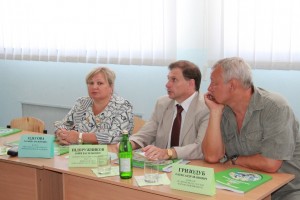 Rector of the State Educational Establishment of Higher Education “PermStatePharmaceuticalAcademy” of Federal Agency of Public Health and Social Development of the Russian Federation (Perm, Russia), D.Sc. in Pharmacy, professor of T.F. Odegova has become a special guest of the VIIth scientific and practical conference with international participation “Quality Management in Pharmacy”.
Rector of the State Educational Establishment of Higher Education “PermStatePharmaceuticalAcademy” of Federal Agency of Public Health and Social Development of the Russian Federation (Perm, Russia), D.Sc. in Pharmacy, professor of T.F. Odegova has become a special guest of the VIIth scientific and practical conference with international participation “Quality Management in Pharmacy”.
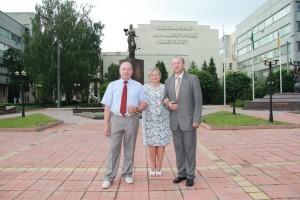 Professor T.F. Odegova told the audience at the plenary session about the educational institution that she leads, such as fundamental and applied researches that are being conducted in the Academy, including development of pharmacoeconomic approaches to establishment of standards of medical therapy, purposeful synthesis of new compounds with anticonvulsant, neuroprotective, anti-inflammatory, antihypertensive, antiarrhythmic, antimicrobial activity; pharmacological studies of biological activity, preclinical safety study, development of new dosage forms; creation of the methods for control and evaluation of substances and finished dosage forms quality; development of legislative and regulatory support of organization of pharmaceutical activities, including licensing of pharmaceutical activity and labour safety in pharmaceutical organizations; improvement of organizational forms of medicines provision for population and public health care institutions; development of methodological basis for functional and cost management of business processes in pharmaceutical organizations, theoretical – methodological and applied aspects of regional pharmaceutical market in Russia, etc. “For the last 20 years, scientists of the Academy received 117 patents, and 78 of them – on new synthesized drug substances” – professor Odegova noted.
Professor T.F. Odegova told the audience at the plenary session about the educational institution that she leads, such as fundamental and applied researches that are being conducted in the Academy, including development of pharmacoeconomic approaches to establishment of standards of medical therapy, purposeful synthesis of new compounds with anticonvulsant, neuroprotective, anti-inflammatory, antihypertensive, antiarrhythmic, antimicrobial activity; pharmacological studies of biological activity, preclinical safety study, development of new dosage forms; creation of the methods for control and evaluation of substances and finished dosage forms quality; development of legislative and regulatory support of organization of pharmaceutical activities, including licensing of pharmaceutical activity and labour safety in pharmaceutical organizations; improvement of organizational forms of medicines provision for population and public health care institutions; development of methodological basis for functional and cost management of business processes in pharmaceutical organizations, theoretical – methodological and applied aspects of regional pharmaceutical market in Russia, etc. “For the last 20 years, scientists of the Academy received 117 patents, and 78 of them – on new synthesized drug substances” – professor Odegova noted.
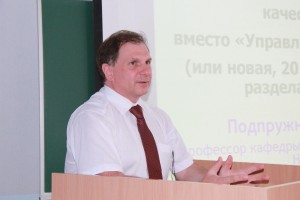 Famous Ukrainian expert on good pharmaceutical practices D.Sc. in Pharmacy, professor of the Department of Quality Management (NUPh), Yu.V.Pidpruzhnykov made the report on “Pharmaceutical Quality System and its implementation to the requirements of GMP». In particular he said: “The peculiarity of GMP rules is that they are quickly changing. Introduction to the list of mandatory requirements for the concept of pharmaceutical quality system (PhQS), described in details in the document ICH Q10 is major change in the EU GMP in 2013. PhQS is control system for management of pharmaceutical company and for its quality control. The most fundamental among introduced changes is the focus on continuous improvement of product quality and processes, efficiency maintenance of all production processes and of the pharmaceutical the quality system itself, leading role and responsibility of top management for the implementation and operation of effective PhQS, usage of the process approach in the management of enterprise rather than functional and others”. The speaker underlined that in the modern edition of the first chapter of the EU GMP pharmaceutical quality system is also applied to such stage of the life cycle of medicines as pharmaceutical product development.
Famous Ukrainian expert on good pharmaceutical practices D.Sc. in Pharmacy, professor of the Department of Quality Management (NUPh), Yu.V.Pidpruzhnykov made the report on “Pharmaceutical Quality System and its implementation to the requirements of GMP». In particular he said: “The peculiarity of GMP rules is that they are quickly changing. Introduction to the list of mandatory requirements for the concept of pharmaceutical quality system (PhQS), described in details in the document ICH Q10 is major change in the EU GMP in 2013. PhQS is control system for management of pharmaceutical company and for its quality control. The most fundamental among introduced changes is the focus on continuous improvement of product quality and processes, efficiency maintenance of all production processes and of the pharmaceutical the quality system itself, leading role and responsibility of top management for the implementation and operation of effective PhQS, usage of the process approach in the management of enterprise rather than functional and others”. The speaker underlined that in the modern edition of the first chapter of the EU GMP pharmaceutical quality system is also applied to such stage of the life cycle of medicines as pharmaceutical product development.
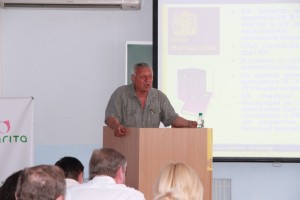 The theme of the report of the Director of State Enterprise “Ukrainian Scientific Centre for Pharmacopoeial quality of drugs”, D.Sc. in Chemistry, professor O.I. Gryzodub was discussion of cooperation of Ukraine with the British Pharmacopoeia. The speaker noted that on March 18 this year Ukraine became a full member of the European Pharmacopoeia, which requires significant adaptation of development concept of the State Pharmacopoeia of Ukraine. The experience of the British Pharmacopoeia and the U.S. Pharmacopoeia, which are generally accepted as the bases for specifications of generic drugs manufacturers of finished pharmaceutical products, is particularly important to solve this problem. Therefore, on May 2, 2013 inLondon in the office of the British Pharmacopoeia, after three years of negotiations, an agreement on cooperation between the British Pharmacopoeia and PharmacopeiaCenter was signed. Taking into account the presence of similar agreements with the United States Pharmacopoeia (USP), it considerably simplifies the development of monographs for finished pharmaceutical products for the State Pharmacopoeia of Ukraine (SPU) in light of national identity and experience USP and British Pharmacopoeia. For example, quantification by high performance liquid chromatography (HPLC) and test “Dissolution” can be taken from the USP, and control of impurities and spectrophotometry – from the British Pharmacopoeia. Signing of the agreement with the British Pharmacopoeia is the first strategically important step of the SPU as a part of the European Pharmacopoeia.
The theme of the report of the Director of State Enterprise “Ukrainian Scientific Centre for Pharmacopoeial quality of drugs”, D.Sc. in Chemistry, professor O.I. Gryzodub was discussion of cooperation of Ukraine with the British Pharmacopoeia. The speaker noted that on March 18 this year Ukraine became a full member of the European Pharmacopoeia, which requires significant adaptation of development concept of the State Pharmacopoeia of Ukraine. The experience of the British Pharmacopoeia and the U.S. Pharmacopoeia, which are generally accepted as the bases for specifications of generic drugs manufacturers of finished pharmaceutical products, is particularly important to solve this problem. Therefore, on May 2, 2013 inLondon in the office of the British Pharmacopoeia, after three years of negotiations, an agreement on cooperation between the British Pharmacopoeia and PharmacopeiaCenter was signed. Taking into account the presence of similar agreements with the United States Pharmacopoeia (USP), it considerably simplifies the development of monographs for finished pharmaceutical products for the State Pharmacopoeia of Ukraine (SPU) in light of national identity and experience USP and British Pharmacopoeia. For example, quantification by high performance liquid chromatography (HPLC) and test “Dissolution” can be taken from the USP, and control of impurities and spectrophotometry – from the British Pharmacopoeia. Signing of the agreement with the British Pharmacopoeia is the first strategically important step of the SPU as a part of the European Pharmacopoeia.
To the issue of self-inspection (internal audit) in pharmaceutical companies was dedicated the lecture of associate professor of I.M. Sechenov First Moscow State Medical University, leading expert of the Union of Professional Pharmaceutical Organizations, associate member of the Organizing Committee of Industrial Pharmacy Section of the International Pharmaceutical Federation (FIP) A.P. Meshkovskiy.
The speaker said that important section of the GMP rules is the system of clearly detailed instructions to implement technological, control and auxiliary operations. To control compliance with these instructions, internal audits, known as self-inspections, are practiced in the enterprises. In the GMP rules there is a definition of “self-inspection and quality audit”, which many experts consider synonyms. However, the speaker noted that it is more correct to understand in these definitions two different organizational and methodological approaches, which in practice are often used in complex combination with one another. Self-inspection – some “rehearsal” of the official inspection, short-term goal of which is to forestall the official inspector. The tactical goal is improvement of survey reports, strategical goal is identification and elimination of deviations from statutory requirements. The purpose of quality audit – identification of vulnerabilities, risks in the quality system. For its realization the external experts are often involved, and to organize and carry out such measures ISO 9000 standards can be used. Method of active transparency (so-called “Johari approach”) can be considered as progressive practice of the audits.
The next speaker – D.Sc. in Pharmacy, head of Scientific and Research Laboratory of parenteral and oral liquid medicines, professor of the NUPh Department of Quality Management, senior staff scientist L.G.Almakayeva – told about quality standardization of the primary packaging of parenteral medicines. The speaker described in detail the types of packaging of liquid dosage forms, explained the importance of quality indicators for glass containers such as hydrolytic stability, alkali-resistance, residual stresses, thermal resistance, light-protective properties, deviations from ampoules ovality, fracture strength of the ampoules with color ring, radial beat of the ampoules stem. Then professor Almakayeva commented on the benefits of polymeric packaging – elasticity, low crispness or its absence, transparency (which allows to control the presence of impurities), lightness and convenience in transportation, possibility of temperature sterilization, ability to use medicines in emergency situations. The author said that one of the major trends that are observed today in the world market of primary pharmaceutical packaging is the gradual replacement of ampoules to syringes, whose share is increasing by 7.9% annually. The advantages of syringes: time saving, convenience, possibility to use at home and in emergency situations, increased reliability of sterility. With that in any case the packaging that is in direct contact with the medicine should be considered as part of the medicine. Therefore, upon registration of the medicine, to the Expert Centre must be submitted: rationale for choosing the primary packaging, information on the suitability of primary packaging for storage, transportation and convenience medicine usage, data on primary packaging materials, their inertia and security, affirmation of packaging integrity, affirmation of the absence of interaction between the components of the medicines and packaging materials, quality specifications.
“Updated in 2013 EU GMP requirements include formation of so-called pharmaceutical quality system in medicine production enterprises, the organization of which is foreseen in the context of provisions of ISO 9001 international standard – noted in his report “Some formation aspects of pharmaceutical quality systems in domestic enterprises” the next participant – CSc in Pharmacy, associate professor of the NUPh Department of Quality Management V.A.Lebedinets.
– Soon the new GMP rules will be adopted in Ukraine, because our country is the member of PIC / S. This means that the control system of domestic pharmaceutical companies should be essentially changed that requires the development of new mechanisms to achieve quality objectives”.
The speaker informed that quality management systems according to ISO 9001 standard has been introduced in less than one third of all medicines manufacturing companies in Ukraine, because many domestic medicines manufacturing companies are lacking necessary experience. At the same time, the basis of ISO 9001 standard lies in the process and systematic approach to organization management. It is expected to “split up” all activities in separate interrelated processes and manage them in accordance with the requirements put in the standard, “investing” in these processes and mechanisms implementation of industry-specific requirements. Associate professor Lebedinets stressed that formation of PhQS should not be limited to renaming of the paragraphs into the process – it’s just a formality. The main thing is to ensure clear correlation of all critical activities through unambiguous definition of I / O processes, and creation of their standardized algorithms that meet the concept of PDCA.
The report of CSc in Engineering, associate professor of the NUPh Department of Physics V.E.Dobrova was devoted to planning and evaluation of clinical researches as a component of the system of the good quality of medicines.
The aim of the research lies in theoretical, scientific and practical justification of methodology for planning and evaluation of clinical trials of the medicines by developing the conceptual framework, mathematical models that take into account the peculiarities of these researches, scientific approaches and methodological aspects regarding the planning processes and processing of their results. The speaker shared experience regarding development of the methods of statistical evaluation of tolerability of medicines in clinical trials, explained the proposed generalized algorithm of evaluation of the effectiveness of medicine during CT, talked about methodological aspects of data management in clinical trials. The idea of staff interaction in creation of data management system in CT has been in detail covered in the report and the system of stimulation of participation in clinical trials for patients and healthy volunteers has been validated; these, according to the author, can significantly improve the quality of clinical trials.
On the prospects of using of differential scanning colorimetry for the study of filtering quality of medicines reported head of the development laboratory on pharmaceuticals technology of JSC “Farmak”, CSc in Pharmacy G.I.Borshchevsky. The speaker informed the audience about the usage of sterilizing filtration, which is one of the main stages of production process of parenteral preparations in the form of solutions that cannot be sterilized. Loss of main and auxiliary substances thus can be 3-5%, and in this case the filter material is very important. According to the exploratory work of four experimental-industrial series of medicine “Lesfal” the problem of loss components has appeared. It has been suggested that the reason for preservative sorption (loss) is the filter, and more specifically its thermal characteristics.
Therefore during pharmaceutical development a study of the effect of the filters from different manufacturers on the quality of Lesfal filtration was conducted. The speaker told in details about the experiment, on the results of which it has been proven that the cause of loss of preservative during filteration there is presence of additional thermal effects in the filter material, resulting in the sorption of preservative.
Deputy head, senior staff scientist of the NUPhState scientific-research Laboratory for Quality Control of Medicinal Products S.M.Gubar made a report on “Standardization of the use of thin layer chromatography method in the programs for professional testing of the laboratories for quality control of medicinal products”. The speaker told about the professional testing programs (PTP) for the laboratories for quality control of medicines, which is used as an instruments of standardization of laboratories work, systematic control and evaluations of their professional competence, standardization of testing with the most common methods of analysis used in laboratories for quality control of medicines in Ukraine, in particular, at the stage of state control.
“At the same time metrological characteristics of methods of analysis are evaluated, sources of possible errors in the research are found out, recommendations for improvement of laboratories for the analysis of drugs by this method are given” – S.M.Gubar explained.
As part of the 6th round of PTP, test of the results of accompanying impurities analysis of 3-Aminopropanol by visual and numerical evaluation has been conducted, and as the part of the 7th round of the PTP – test of the results of impurities analysis of fumaric acid and unidentified impurities analysis in the test sample of maleic acid by visual and numerical evaluation. Methods provided for testing and evaluation of the results in accordance with the general chapter of the State Pharmacopoeia of Ukraine (SPU) 2.2.27 “Thin layer chromatography” (TLC). Laboratories of pharmaceutical companies, regional state inspections for quality control of medicinal products, authorized laboratories and other organizations participated in the rounds. During the rounds of PTP-6 and PTP-7 problems in testing by TLC were identified. Comparative analysis of the changes in the results of recovery rate of Rf values with preliminary results showed worsening of the results of recovery rate of Rf values from 2004 to 2008, nearly twice the value.
The author underlined that currently it is impossible to use specific Rf values to identify substances without the use of standard samples of these substances in analytical and normative documentation, i.e. methods of quality control of medicines. According to statistical evaluation, a critical state of medicine quality control is observed in the pharmaceutical industry according to the TLC method. The results cast doubt the ability of the mast laboratories for quality control of medicines to properly analyze and develop methodology using this method.
Teaching assistant of the NUPh Department of Management and Economics of EnterpriseM.I.Sidorenko devoted her report to standardization of scientific-research and research- design work in pharmacy. The author reasonably assured that the scope of scientific-research and research- design developments (SRRDD) should also be covered by standardization process, since the orientation of the pharmaceutical industry for investment-development model foresees the importance of the factor of increasing share of domestically produced medicines in the market. In its turn, this is possible only after assortment replenishment with effective, safe, quality and affordable domestic medicines. Significant changes that have occurred in the legal and regulatory aspects of pharmaceutical industry make think that there is a need for new research (SRRDD) methodology in pharmacy, in which knowledge management, management of changes and regular updates will play a key role.
The speaker told about the researches in this area that are conducted under the supervision of professor A.V.Posylkina at the NUPh Department of Management and Economics of Enterprise.
Teaching assistant of the NUPh Department of Management and Economics of EnterpriseA.G.Khromykh reported on the study on topic “Clinical Logistics as an improvement instrument of quality and efficiency of clinical trials”. The speaker showed that the global pharmaceutical logistics market in 2012 amounted to 47 billion U.S. dollars.
“It is predicted that in the next few years, average annual addition in global pharmaceutical logistics market will be 7.6%. Thus, by 2015, this market could reach 63 billion Euro,”- said teaching assistant A.G.Khromykh and concluded that the current stage of development of pharmaceutical logistics is connected with appearance of qualitatively new strategic innovation concept – clinical logistics.
Application of logistic approach in the activity of contract-research organizations (CRO) will significantly improve the profitability and quality of logistics services, and will ensure effective processes management in CRO, which will guarantee significant advantages in competitive struggle in the global market of clinical trials (CT).
All these factors increase the importance of modern technologies and methods in the field of logistics of CT to provide the required level of quality and effectiveness of their implementation. Prerequisites for the development of clinical logistics in Ukraine: convenient geographical location of the country; extensive network of highways, railways, courier services; low cost of personnel and internal transportation countrywide.
By clinical logistics author understands activities aimed at sustainable management of the material and accompanying flows (financial and informational) at all stages of CT of medicines in order to optimize expenses and time, to use resources in the most efficient way and to suppotr the requirements for quality of CT. This is a subject of further researches of the speaker.
Postgraduate student of the NUPh Department of Physics K.L.Ratushnaya devoted her report to the development of methodological approaches to the creation of standard operating procedures in place of clinical trial. The speaker said that in accordance with Good Clinical Practice (GCP), the important instrument of quality assurance planning, organizing, conduction and analyzing of clinical trials (CT) of medicines is standard operating procedures (SOPs) that present documented procedures for all research processes, which clearly defines the duties and responsibilities of personnel involved in them. Today SOPs are of considerable importance.
Organization of CT involves a substantial amount of work and initiates the implementation of a large number of processes, which require an extensive list of SOPs. In order to standardize documentation of processes for CT, it was suggested to identify three main blocks of SOPs: administrative, technical and laboratory SOPs. The author conducted a detailed analysis of the choice of presentment style of SOP, depending on its functional purpose. Based on the proposed approaches with the participation of the author, SOP A – 1.01 “Development of standard operating procedures” for the Clinical-diagnosticCenter of the NUPh – has been developed.
“Standardization of medicinal plant raw material according to the U.S. Pharmacopoeia” – is the topic of Yu.S. Prokopenko, teaching assistant of the NUPh Department of Quality, Standardization and Certification of Medicines of the Institute of Pharmacy Professionals Qualification Improvement. The author reported that introduction of Food and Drug Informatics Database project (a.k.a. Spectral Library), which involves prevention of the circulation of counterfeit products through creation of a portable laboratory for quality control, has recently became one of the directions of the USP work. Taking into account that the procurement of medicinal plant raw material (MPRM) is carried out not only in standardized plots, the question of determination of the possibility of usage of portable equipment for quality control of herbal products became urgent.
To make a research were used aerial parts of Labiatae family plants: sweet basil (Ocimum basilicum), common origanum (Origanum vulgare), garden sage (Salvia officinalis), creeping thyme (Thymus serpyllum), pepper mint (Mentha piperita), garden balm (Melissa officinalis), rosemary (Rosmarinus officinalis), which were collected in the area of Botanic Garden in Washington city. In addition, it was decided to conduct research of spices, teas and phytomixtures of herbs that contain these types of plant material. As the result of the study was determined that the portable analytical methods are possible for initial identification of raw materials and assertion of its identity, which is very important for quality control of crushed into powder samples. In the future, the described methods can be used for implementation in the SPU after determination of their validation properties.
Continuing the theme
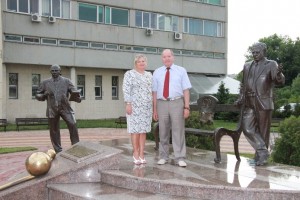 As the part of the conference rector of PermStatePharmaceuticalAcademy, D.Sc. in Pharmacy, professor T.F. Odegova visited the NUPh. For the honorary guests was prepared cultural program – sightseeing tour around the academic buildings, laboratories, Museum of the History of Pharmacy. Professor T.F. Odegova told about PermStatePharmaceuticalAcademy. “In Russia are now operating two profession oriented higher education institutions – in St. Petersburg and Perm. Perm State Pharmaceutical Academy was founded in 1936 as the Perm State Pharmaceutical Institute. Since 2011, it is the State Educational Establishment of Higher Education “Perm State Pharmaceutical Academy” of Federal Agency of Public Health and Social Development of the Russian Federation.
As the part of the conference rector of PermStatePharmaceuticalAcademy, D.Sc. in Pharmacy, professor T.F. Odegova visited the NUPh. For the honorary guests was prepared cultural program – sightseeing tour around the academic buildings, laboratories, Museum of the History of Pharmacy. Professor T.F. Odegova told about PermStatePharmaceuticalAcademy. “In Russia are now operating two profession oriented higher education institutions – in St. Petersburg and Perm. Perm State Pharmaceutical Academy was founded in 1936 as the Perm State Pharmaceutical Institute. Since 2011, it is the State Educational Establishment of Higher Education “Perm State Pharmaceutical Academy” of Federal Agency of Public Health and Social Development of the Russian Federation.
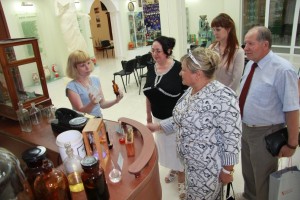 The Academy is licensed by the Federal Service for Supervision in Education and Science to conduct educational activities in the field of higher education, postgraduate and professional education. Our graduates work in the fields of pharmaceuticals’ and medical products creation, quality control, organization of public medicine supply, chemical, physico-chemical and forensic chemical analysis. According to the license, the Academy conducts educational activities under professional programs – higher professional education in full-time and correspondence courses (5 and 5.5 years, respectively) for “Pharmacist” qualification; postgraduate course (3-4 years) (specialties: Organic Chemistry, Pharmacology, Technology of drugs, Pharmaceutical Chemistry and Pharmacognosy; Organization of Pharmacy); internship course (1 year) and advanced training and retraining of key employees and professionals (specialties: Management and Economics of Pharmacy, Pharmaceutical Technology, Pharmaceutical Chemistry and Pharmacognosy).
The Academy is licensed by the Federal Service for Supervision in Education and Science to conduct educational activities in the field of higher education, postgraduate and professional education. Our graduates work in the fields of pharmaceuticals’ and medical products creation, quality control, organization of public medicine supply, chemical, physico-chemical and forensic chemical analysis. According to the license, the Academy conducts educational activities under professional programs – higher professional education in full-time and correspondence courses (5 and 5.5 years, respectively) for “Pharmacist” qualification; postgraduate course (3-4 years) (specialties: Organic Chemistry, Pharmacology, Technology of drugs, Pharmaceutical Chemistry and Pharmacognosy; Organization of Pharmacy); internship course (1 year) and advanced training and retraining of key employees and professionals (specialties: Management and Economics of Pharmacy, Pharmaceutical Technology, Pharmaceutical Chemistry and Pharmacognosy).
Since the foundation of higher education institution about 25,000 professionals with higher pharmaceutical education have been prepared.
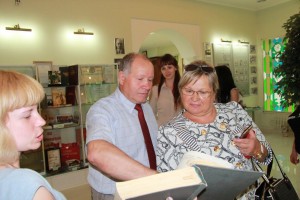 The Academy provides training of highly qualified specialists for the regions of Urals, Western Siberia, Volga region, and for the 16 countries of the Middle East, Africa and Southeast Asia.
The Academy provides training of highly qualified specialists for the regions of Urals, Western Siberia, Volga region, and for the 16 countries of the Middle East, Africa and Southeast Asia.
The Academy consists of 5 Faculties, that unite 24 Departments, scientific library, regional testing center “Pharmatest” of Federal Agency for Healthcare and Social Development (FAHSD) for Standardization and Quality Control of Drugs, regional FAHSD educational center for analytical diagnostics of availability of narcotic drugs, psychotropic and other toxic substances; Dissertation Council for all pharmaceutical specialties, Institute of human valeology, Pharmaceutical department, Dental clinic, Research and Education Center, Center for Distance Education, Center for personnel retraining, Center for Information Technology, Publishing Department, 6 research laboratories.
We have 5 teaching laboratory buildings, two student hostels, 5 teaching and industrial pharmacies, seedling nursery for medicinal plants.
Currently, in the Academy are being trained more than 4,000 students, including more than 200 foreign students. We have a students’ scientific society, academic exchange programs with institutions of the United States, Switzerland, Germany, Israel and other countries are functioning. 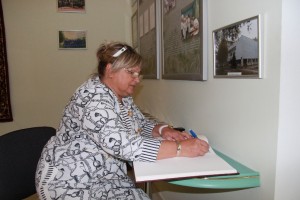 The quality of education is provided by academic teaching staff, 70.5% of which have scientific degrees and titles. With National University of Pharmacy we are united by long-standing partnership, because so many of our current teachers studied in the NUPh postgraduate course. Today we negotiated and signed an agreement on academic exchange”.
The quality of education is provided by academic teaching staff, 70.5% of which have scientific degrees and titles. With National University of Pharmacy we are united by long-standing partnership, because so many of our current teachers studied in the NUPh postgraduate course. Today we negotiated and signed an agreement on academic exchange”.
In comments book, that is kept in the Museum of History of Pharmacy, rector of PermStatePharmaceuticalAcademy prof. T.F.Odegova left the friendly greetings to Ukraine and the NUPh, and appreciations for the warm reception.
Elena Yakovleva
[flagallery gid=26 name=Gallery]
